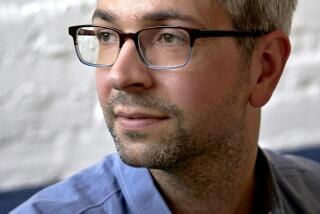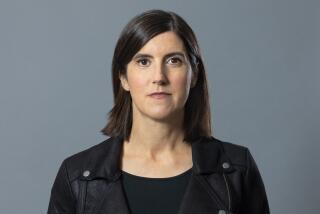Write What You Can’t Know : A SOUTHERN FAMILY <i> by Gail Godwin (William Morrow & Co., Inc.: $18.95; 540 pp.)</i>
A family system is held together by years of common assumptions and a dependence on its members to play their assigned roles. While they do, the system works. But let one individual spin out of orbit and the others are flung wide, struggling for their bearings until gradually, under revised rules, they regroup.
Gail Godwin’s brilliant new novel, “A Southern Family,” is the story of one family’s regrouping in the wake of a collapse. The book opens as the Quick family gathers in the small town of Mountain City (state unnamed but presumed to be Tennessee) to celebrate the birthday of its matriarch, Lily. Despite the occasion, no one dreams of behaving well. Lily’s husband Ralph tells bawdy jokes. Lily seethes and tension mounts until Theo, the eldest son, makes some crude, misogynistic remarks that spark a shouting match with his brother Rafe. When Julia Richardson, a family friend who has been counting the minutes till she can leave, finally escapes, Theo follows her, “pulsing . . . with his need to talk, to confide.”
But like the Quicks, Julia is good at deflecting troublesome Theo. Less attractive, less intelligent, less successful than his brother (or so goes family legend), he has already married badly, divorced and come home again with his 3-year-old son. As his half-sister Clare remarks glibly to Julia, he’s “in terrible shape, more difficult than ever.”
Neither Julia nor Clare sense the prophecy in Clare’s words. The next day, Theo is found dead, alongside a girlfriend who rejected him, in an apparent murder/suicide.
“A Southern Family” takes off from Theo’s death on a discursive exploration of family history and relationships as the Quicks struggle to measure their blame and--belatedly--to know the brother and son they failed in life.
This exploration gives the book its narrative richness. Like a good reporter, Godwin gathers statements from everyone in range: family members, friends, Theo’s ex-wife, his sister’s lover. In alternating chapters, combining third-person and first-person narrative, interior monologue, poems and letters, she creates a complex weave of subjectivity and demonstrates the power of reflection and observation to illuminate the self.
Along the way--amid a panorama of Southern society, and with numerous stops to muse on aging, success, racism and art--she dramatizes the paradox of family life. It is a messy and even murderous business. Within its stuffy confines, where children jockey for their parents’ attention and parents squander their children’s trust through endless bickering, there is no such thing as individual rights. Dreams must flourish in secret, away from the shared expectations of the group.
But when a novelist returns home, she might nonetheless find her “own best material,” as Clare Campion, Theo’s sister, does. For years, Clare has made a comfortable living writing novels that are “deep-breathing, reflective and with that patience for detail she admired in medieval stone carvers.” Yet, in one of their last talks, she is “demolished” by Theo’s evaluation of her work.
“You take care of your characters so nicely,” he tells her. “You let them suffer a little, just enough to improve their characters, but you always rescue them from the abyss at the last minute. . . . Why don’t you write a book about something that can never be wrapped up?”
In fact, “A Southern Family,” Godwin’s seventh novel, is such a book. It is also, given the novelist character at its center, a strongly self-referential work, one that says as much about the writer’s craft as it does about families.
In the weeks after Theo’s death, his words haunt Clare. Returning home to New York, she throws out a novel she has worked on for a year. Soon, she travels south again, searching for truth in the poor mountain family Theo married into; in her own parents; in her friend Julia, who has herself come home to Mountain City to care for an aging father.
Late in the book, Clare has begun notes for a scene that closely resembles an early scene in “A Southern Family,” implying that Clare--and Godwin, who was raised in Asheville, N.C.--has found what Clare’s lover calls the artist’s “true subject, the truth he can no longer escape rather than the illusions he has been longing to make true.”
This truth, for both Clare and Godwin, is by definition open-ended. It does not lend itself to neat conclusions or suspenseful climaxes but rumbles on ruminatively, showing “the true and the false, the good and the bad . . . in everybody,” as it lights up the fusty corners of family life.
More to Read
Sign up for our Book Club newsletter
Get the latest news, events and more from the Los Angeles Times Book Club, and help us get L.A. reading and talking.
You may occasionally receive promotional content from the Los Angeles Times.






